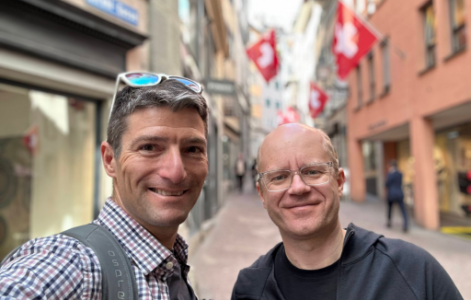Accelerating clinical trials and access to treatments
by Lawrence Korngut, MD, and Blaine Penny, Calgary, Canada

This is a very exciting time for the FSHD community, as new therapeutics are advancing through clinical development and the global patient community is coming together to collaborate as part of new initiatives. This began with the FSHD Society and FSHD Canada Foundation creating Project Mercury two years ago to develop a global framework and toolkit to support the acceleration of clinical trials and ensure patients could get access to new therapies when they are approved.
Over the past year, Lumiio has been working closely with the FSHD Society and FSHD Canada Foundation on the next steps to operationalize this important work. The result is the creation of the Global FSHD Innovation Hub (the Hub) just a few months ago. The Hub is owned by the FSHD Society, and its mission is to provide a singular global end-to-end offering for biopharma companies to accelerate their products for FSHD and get these potential new treatments to people faster. The Hub evolved through the global vision and leadership of the FSHD Society, and is a formal partnership among the FSHD Society, TRiNDS, and Lumiio.
Here is what they bring to the table
- The FSHD Society is focused on patient engagement, education, support and healthcare navigation, and access to clinical trials.
- TRiNDS is a neuromuscular disease (NMD)-specific contract research organization with a successful track record of 30+ projects and a global network of 200+ NMD-experienced sites. TRiNDS will play a key role in site selection and executing the trial operations to improve overall trial capacity and success.
- Lumiio specializes in patient registries, real-world data (RWD) platform technology, site optimization, and the development and validation of digital healthcare tools. (The FSHD Society’s BetterLife project was built on the Lumiio platform.)
Why is the Hub needed?
More than 80% of clinical trials experience significant delays due to limitations in sites’ capacity for enrolling participants. This becomes a bigger problem as more FSHD trials are launched in the coming years, with increasing demands for qualified sites and recruiting of greater numbers of patients. As the Hub works toward supporting the readiness of clinical trial sites, it will play a key role in proactively identifying and prequalifying sites that are suitable for FSHD trials and that can recruit patients quickly. Further, the Hub will support these sites to maximize their capacity for enrolling more volunteers into clinical trials.
Site capacity is a global problem, as biopharma companies each need a series of larger clinical trials. In a rare disease like FSHD, this requires trial sites across many countries to develop the evidence needed for regulatory approvals. For example, a Phase 3 trial (the final phase confirmatory trial) could involve more than 15 countries and 50+ trial sites.
Getting a new therapy approved is just the first step of the process for patients to be able to obtain access. Biopharma companies need to go through a rigorous health technology assessment (HTA) to receive reimbursement approval. Patient data are needed to show that this new therapy provides meaningful value to patients above the current standard of care to receive reimbursement.
Our goals
One of the primary goals of the Hub is to proactively support existing patient registries and establish new ones such that the data required (e.g., quality of life, activities of daily living, etc.) for an HTA are being generated so patients can access these new therapies as quickly as possible.
Another key function of the Hub is the ability to develop and validate innovations that could help diagnosis, mobility, muscle regeneration, finding patient resources, etc., to improve patient outcomes and quality of life. Some examples of this include use of AI to identify undiagnosed patients through electronic health records, exoskeletons to help with mobility/function, and interactive tools for patients to find relevant helpful information to support their journey and needs (e.g., finding clinicians, clinical trials, equipment, etc.).
Over the past few months, we have engaged in several discussions with biopharma companies, receiving highly positive feedback that affirms our model as an innovative approach for advancing therapies and outcomes in rare diseases.
The authors: Lawrence Korngut is associate professor at the University of Calgary Cumming School of Medicine and leads the University of Calgary Neuromuscular Clinical Trial Program, which has conducted more than 80 clinical trials of new therapies. He is also chief medical officer, and Blaine Penny is director of Innovation and Real Data/Evidence, of the Global FSHD Innovation Hub.


Leave a Reply